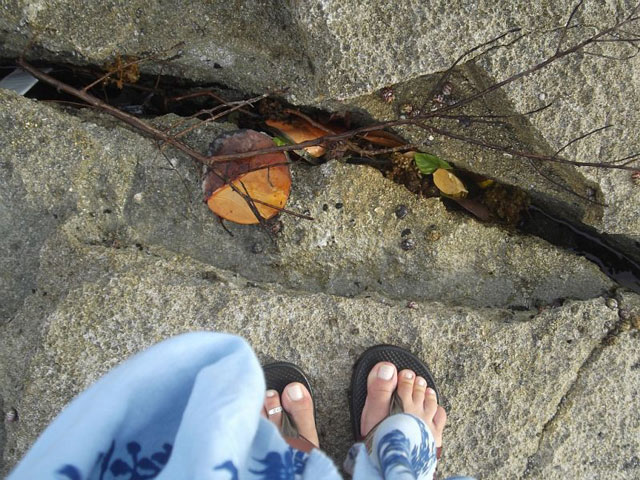
“Walking is not a means, but an end in itself. Each step must make you happy. Each step brings you back to the present moment, which is the only moment you can be alive.” ~ Thich Nhat Hanh
Have you ever considered what it means to walk? Is it a normal function of your body, a form of exercise, a mode of transport from here to there?
How often are you aware of this basic movement? Or, like breathing, does your awareness (and thus your gratitude) not even enter your consciousness?
Aware is what I have become regarding this simple everyday act of putting one foot in front of the other.
For the past two years, due to an ancient hip injury, I could not take a step without debilitating pain. Being a meditation practitioner, I aspire to feel my sensations and emotions as they are without labels or stories so I tried not to view it as “pain.” In this spirit, I tried to be present with the pain, letting it come and go.
This became increasingly difficult to do, both physically and emotionally, as my condition deteriorated to the point where it deeply affected my normal day-to-day functioning.
And so, I made a decision.
As I write this, I am 12 days post-op from surgery that not only took away my pain, but restored my normal walking gait which had become seriously impaired. Not only am I left with a deep sense of gratitude for my surgeon and the many wonderful people who played a part in this difficult journey, but also gratitude for a simple act that restored to me what many of us take for granted every single day.
My first task after the surgery was learning how to walk all over again. I loved that my physical therapist only wanted me to walk barefoot. This made perfect sense, of course, because I needed to really feel the ground; to roll mindfully from heel to toe in order to put pressure and weight where there had been none for quite some time.
Being familiar with walking meditation, I used this approach in my daily exercises. Not only did it help me physically to be mindful of walking through every step with balance, but it also allowed me to be completely present with the new found joy of each step.
If “each step must make you happy,” as Thich Nhat Hanh says, then I discovered another surprising by-product of this painless walking. After my surgery, one of my dear friends commented that my entire face had changed, she was surprised at how much happier and brighter my demeanor was. I realize now that I must have scared people off with the grimace that had become a part of my constant disposition as I desperately tried to get from here to there. Walking happier allowed me to take in my surroundings more, notice more and appreciate more—and this showed in my expression.
Mindfully focusing on my walking, caused me to reflect on other normal functions of our bodies and what we might be missing by not paying close attention. How much do we really notice when we look? How much do we really hear when we listen? How much do we feel when we touch?
As an artist, I like to think that I am probably more aware of my senses and my surroundings only because I have, in part, trained myself to notice, to hear and to see beauty where others perhaps might not. As I have discovered, there is never nothing going on in this incredibly gorgeous and interesting world.
We do not need to be injured or impaired to come to know this. If we can acknowledge what an amazing gift we are given in being able to walk upon the earth, we will never again take for granted all the other wonderful functions and abilities our bodies have to offer.
So as you go about your day, dear reader, let this be a gentle reminder to be greatful for all the incredible functions of your body and walk mindfully in your travels. Try to pay attention and be aware of the fleeting but constant beauty in every birdsong, every play of light, every encounter with our fingertips, and most importantly, in every step.
A guide to walking meditation adapted from Thich Nhat Hanh:
Your Steps Are Most Important
Having peace and joy in your life begins with each step that you take. They are the most important thing because they are deciding what is most important and how successful you will be.
It is Simple to Do
Go slow and try to relax. Maybe you can think about something pleasant, and so it will make you smile. Imagine yourself to be very healthy and secure, with no worries.
Going Without Arriving
Usually when we walk, we have a destination. Maybe we are late, and we have to hurry. This causes needless stress. With walking meditation, there is no destination. The only purpose is to walk. There is no need to hurry anywhere. When you realize this, your body will naturally slow down, because there is no goal.
Trouble-Free Steps
Our daily lives seem to be filled with a lot of anxiety and fear. These fears translate into our steps and walking does not feel natural. Allow yourself to view the world in all its beauty like you did when you were a child walking with a parent. In this way, your walk will be filled with peace and comfort.
Shaking Off the Burden of Worries
Learn to walk so that your footprints carry with them complete freedom. In this way, they leave no marks of worry or concern, only peace. Letting go of fears will unlock the secrets of walking meditation.
~
Author: Linda Laino
Editor: Katarina Tavčar
Photo: Author’s own






Read 6 comments and reply